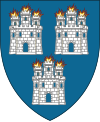Portal:European Union
Introduction
The European Union (EU) is a supranational political and economic union of 27 member states that are located primarily in Europe. The Union has a total area of 4,233,255 km2 (1,634,469 sq mi) and an estimated total population of over 449 million. The EU has often been described as a sui generis political entity combining the characteristics of both a federation and a confederation. Containing 5.8% of the world population in 2020, EU member states generated a nominal gross domestic product (GDP) of around US$16.6 trillion in 2022, constituting approximately one sixth of global nominal GDP. Additionally, all EU states except Bulgaria have a very high Human Development Index according to the United Nations Development Programme. Its cornerstone, the Customs Union, paved the way to establishing an internal single market based on standardised legal framework and legislation that applies in all member states in those matters, and only those matters, where the states have agreed to act as one. EU policies aim to ensure the free movement of people, goods, services and capital within the internal market; enact legislation in justice and home affairs; and maintain common policies on trade, agriculture, fisheries and regional development. Passport controls have been abolished for travel within the Schengen Area. The eurozone is a group composed of the 20 EU member states that have fully implemented the economic and monetary union and use the euro currency. Through the Common Foreign and Security Policy, the union has developed a role in external relations and defence. It maintains permanent diplomatic missions throughout the world and represents itself at the United Nations, the World Trade Organization, the G7 and the G20. Due to its global influence, the European Union has been described by some scholars as an emerging superpower. In 2012, the EU was awarded the Nobel Peace Prize. The United Kingdom became the only member state to leave the EU, in 2020; ten countries are aspiring or negotiating to join it. (Full article...) Selected article The International Court of Justice (known colloquially as the World Court or ICJ) is the principal judicial organ of the United Nations. Its seat is in the Peace Palace at The Hague, Netherlands. Established in 1945 by the Charter of the United Nations, the Court began work in 1946 as the successor to the Permanent Court of International Justice. The Statute of the International Court of Justice, similar to that of its predecessor, is the main constitutional document constituting and regulating the Court. The ICJ should not be confused with the International Criminal Court or a court exercising jurisdiction under Belgium's War Crimes Law, both of which also potentially have "global" jurisdiction. English and French are its two official languages. The Court's workload is characterised by a wide range of judicial activity. Its main functions are to settle legal disputes submitted to it by states and to give advisory opinions on legal questions submitted to it by duly authorised international organs and agencies. The number of decisions made by the ICJ has been relatively small, but there has clearly been an increased willingness to use the Court since the 1980s, especially among developing countries, although the USA withdrew from compulsory jurisdiction in 1986, meaning it accepts the court's jurisdiction on only a case-to-case basis. Selected picturePhotograph credit: Arild Vågen Vaxholm Fortress is a historic fortification on the island of Vaxholmen in the Stockholm archipelago just east of the Swedish town of Vaxholm. The first structure, a wooden blockhouse, was constructed by King Gustav I in 1548 as a defensive structure and customs post at this strategic site on the sea approach to Stockholm. It was replaced by a round stone tower during John III's reign. The present buildings date to 1833; their design was inspired by ideas on fortifications propounded by French engineers the marquis de Montalembert and Lazare Carnot. The fortress has been listed as a state monument since 1935 and now houses the Vaxholm Fortress Museum.
Did you know?... that the presidency of the EU Council rotates every half year? ... that the EU parliamentary election is the world's biggest transnational election? ... that the European Union was awarded the Nobel Peace Prize in 2012? Selected cityDublin is the capital and the largest city of the Republic of Ireland, located near the midpoint of Ireland's east coast, at the mouth of the River Liffey and forms the centre of the Dublin Region. Originally founded as a centre of Viking settlement, the city has been Ireland's capital city since mediæval times. The population within the city was 505,739 at the census of 2006. Beyond this, at the same census the Dublin Region population was 1,186,159, whilst the Greater Dublin Area had a figure of 1,661,185. In a 2003 European wide survey by the BBC, questioning 11,200 residents of 112 urban and rural areas, Dublin was found to be the best capital city in Europe to live in, and the Republic of Ireland was judged to be the most content country in Europe. A person from Dublin is known as a Dubliner or colloquially as a Dub. Dublin is a major European cultural centre and the origin of many prominent literary figures including Jonathan Swift, Bram Stoker, Oscar Wilde, William Butler Yeats, James Joyce, George Bernard Shaw, Seán O'Casey, and Samuel Beckett. General imagesThe following are images from various European Union-related articles on Wikipedia.
TopicsFeatured contentFeatured articles
Featured lists
Featured contentGood articles
CategoriesRelated portalsAssociated WikimediaThe following Wikimedia Foundation sister projects provide more on this subject:
Discover Wikipedia using portals |
































































